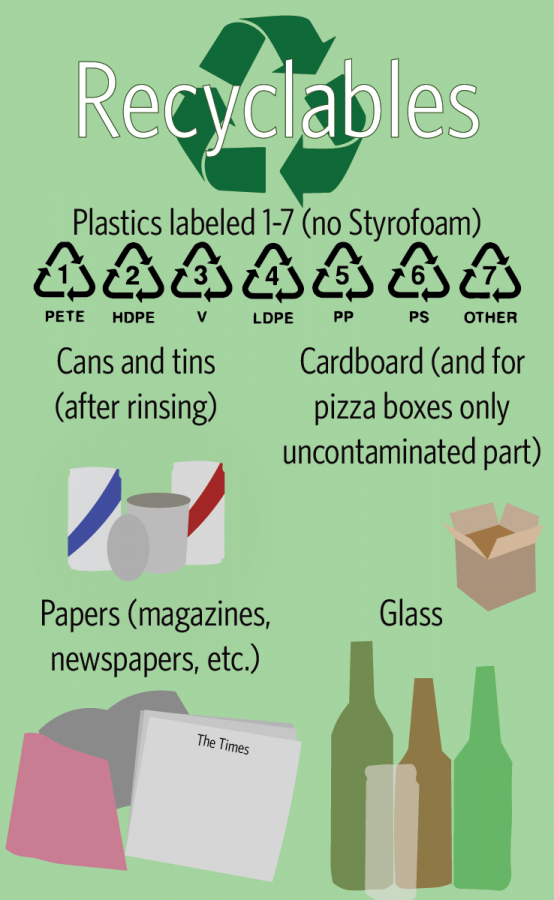Recycling has rules worth effort, consideration
Feb 18, 2019
Welcome to Recycling 101, where most of your recycling inquiries will be answered.
We will begin by discussing some incentives of recycling. Of course, most people these days are well aware recycling’s main purpose is to reuse. This simple claim does not provide much insight into the many benefits created by recycling, so I am here to enlighten you.
Let’s begin with some numbers. According to the Environmental Protection Agency, the U.S. alone generates approximately 230 million tons of municipal waste annually, which is about 4.6 pounds of trash per person every day. Only about 30 percent of this waste is recycled or composted.
National Geographic has found that 91 percent of plastic is not recycled — keep in mind most plastic can be recycled — and a majority of the plastic not recycled is littered.
By recycling, we are protecting our beloved environment by preventing its degradation. In simpler terms, recycling means less waste ends up as litter and in landfills, which minimizes unnecessary pollution. The less pollution we create, the more pure our environments will be.
Get The Daily Illini in your inbox!
It is important to be aware that litter travels and transforms. When recyclable material is carelessly tossed outside, there is potential for this material to end up in our waterways, which eventually contaminates agricultural lands and our drinking water.
This is also true of landfills because a process called leaching occurs, which is when toxins and chemicals from trash leach into the environment. It is best to keep our environment free of pollutants so our produce remains healthy for us and uncontaminated.
Another lesser known incentive for recycling is the support it brings to the American workforce. According to Ecocycle, one of the largest non-profit recyclers in the U.S., 1.1 million new eco-friendly jobs can be created if our recycling rate increases to 75 percent by 2030.
Don’t landfills and incinerators also require people to work and thus create jobs? Yes, but not nearly as much. Recycling jobs create 9 times more jobs than landfill and incinerator facilities. Consistent and attentive recycling is not only good for the environment; it brings economic benefits as well.
So, what can be recycled? Papers, such as newspapers, magazines, notebook papers, loose leaf and printed paper can be; boxes, such as food packages and cardboard as well as plastics and food cans, such as aluminum and other metal can be also.
If the recyclables had contained food at any point, they should be rinsed prior to being placed in your recycling bin. Any cardboard, a common one being pizza boxes, contaminated with food, oil or grease, should not be recycled; however, the top of the pizza box may be fair game.
Chip bags and candy wrappers are another example of material that cannot be recycled, so if you want to go above and beyond, avoid those unhealthy snacks and stick to fresh food instead. Plastics labeled one through seven can be recycled; however, Styrofoam cannot be. (This is true for a majority of recycling facilities, including those serving Champaign-Urbana.)
It does not require much effort to recycle, and the benefits of recycling outweigh any arguments for not doing so. We must work together to live sustainably to care for our increasingly pressured environment. The more mindful we are about switching outdated habits into eco-friendly ones, the longer we can admire the beauties this planet holds. Anything you do matters, for better or for worse.
No matter where you live — house, apartment or dorm — be conscientious. Get a recycling bin and don’t forget to use it.
Aristides is a junior in LAS.






